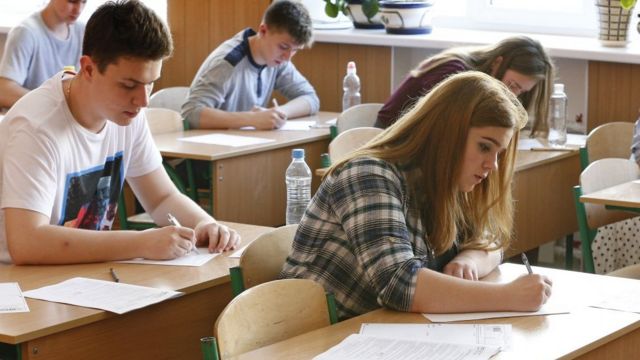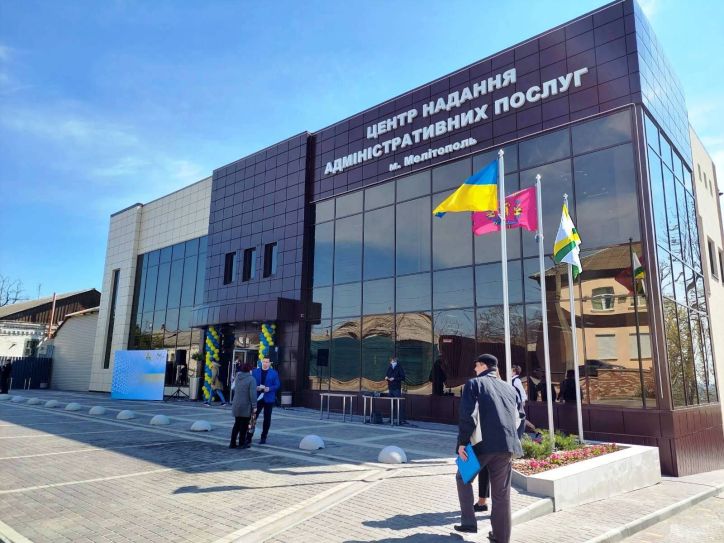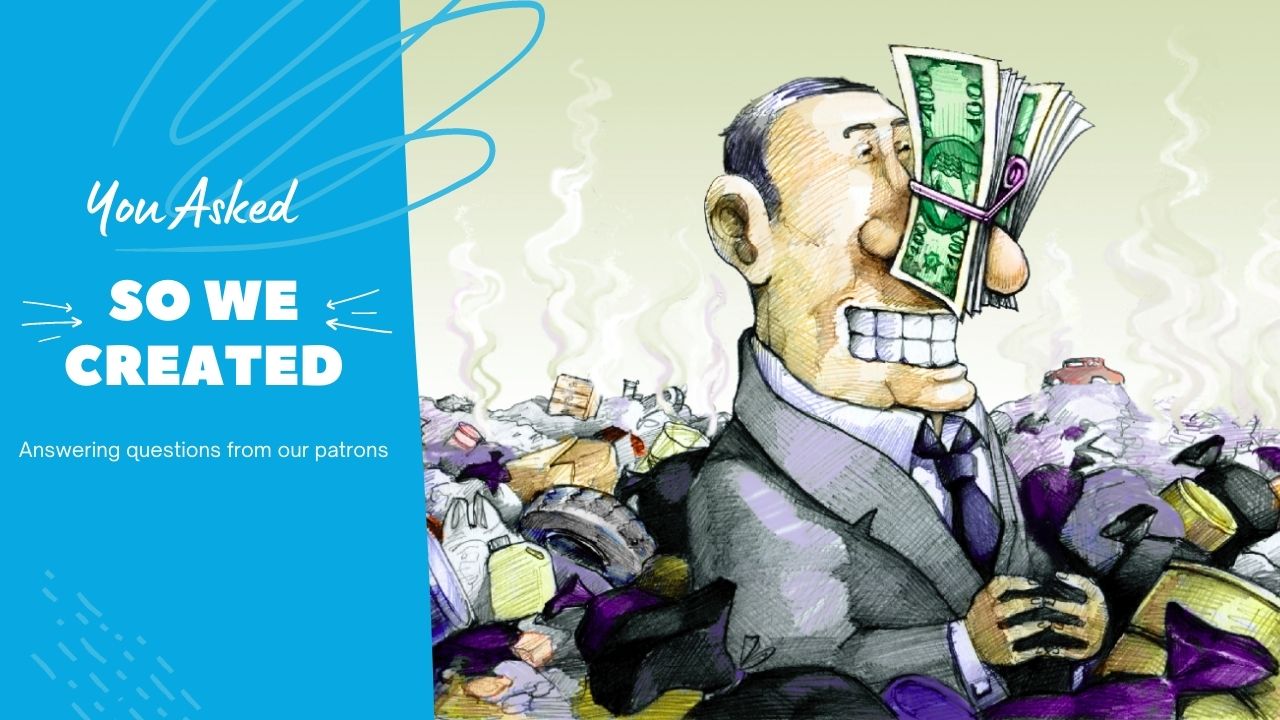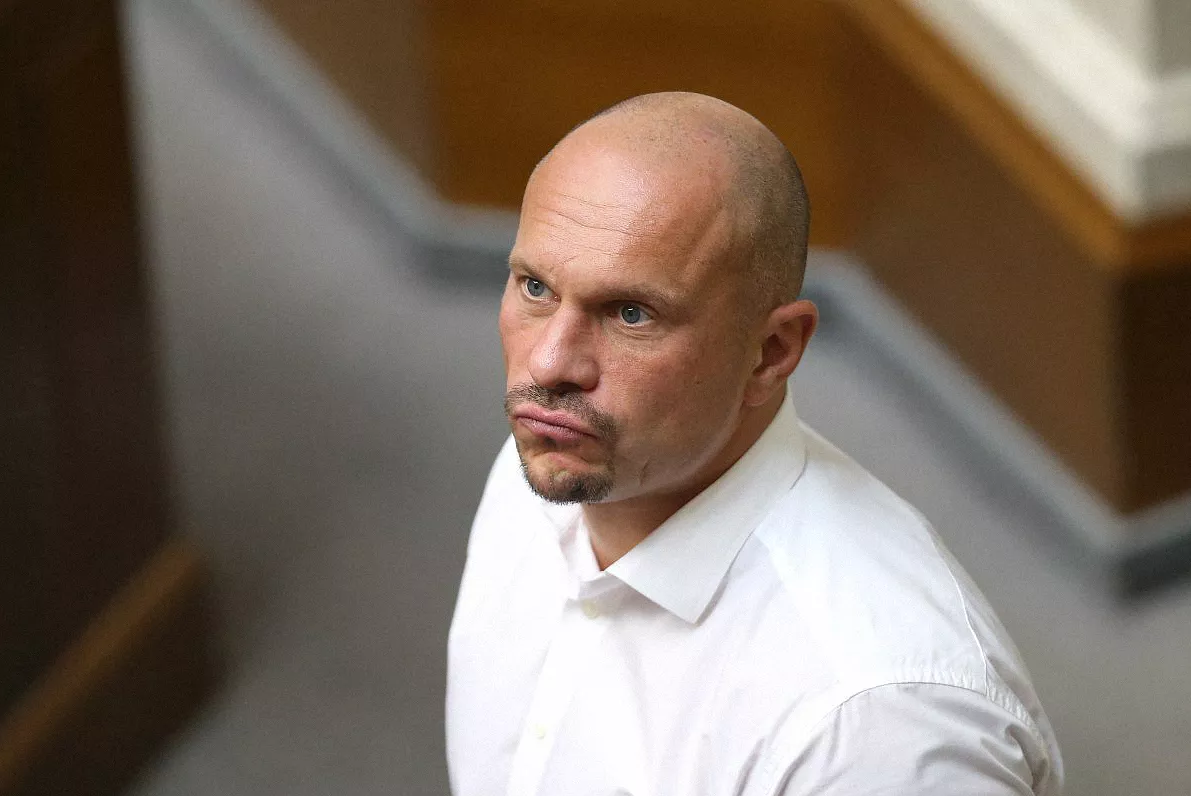New institutions have been created as a result of reforms, and those implemented in particular spheres are mostly free of corruption. At the same time, some still unreformed Soviet rules and practices remain, and they continue to breed corruption. Examples from both sides of the coin give an idea of how far Ukraine has progressed.
Sources of daily corruption
Although no country can eliminate corruption entirely, societies that have experienced extreme violence or totalitarianism have a special predisposition for corruption. Why? Because corruption for them was the only way of survival for decades. In Ukraine, personal connections and bribes were the quickest ways to get all sorts of things during the Soviet era.
The iconic example was giving “gifts” to a vendor in the marketplace that were more than the actual price, in order to obtain goods that were deficient in state shops. Another common tactic was to use personal ties with officials to jump the queue for state accommodation or to secure better employment in the state-delineated hierarchy.
Generally, there were two essential conditions for the flourishing of corruption during Soviet times, and in some of Ukraine’s unreformed sectors they still persist:
- Existence of the de-jure practice to obtain accommodation, land, education or various goods free-of-cost from the state; while de-facto all of these are limited and granted only to those who can “come to terms” with officials;
- Absence of clearly defined, open competition while employing in government institutions, purchasing or selling state goods, applying for mandatory registration such as a driver’s license. This absence of transparent competition allows officials to use subjective criteria to determine who is granted these rights; bribes are expected to influence their decisions.
Five success stories that have reduced commonplace corruption in Ukraine
1998. Simplified tax system for small entrepreneurs (FOPs), and online registration of businesses with low taxes
Ukraine was and generally remains a country with very high taxes, which on average draw about 50% from salaries and profits. With already low salaries, such conditions have only discouraged active entrepreneurship, while generating a shadow economy and shadow employment, to hide shadow business altogether.
Alleviating the issue was the creation of a special entity for sole entrepreneurs — the FOP. Designed to accommodate the unique characteristics of smaller business, among other efficiencies FOPs benefit from a simplified tax system. They are targeted to small or medium-sized businesses that do not exceed UAH 7 million ($270,000) in annual revenue. Owners can hire both local and foreign employees.
The FOP was introduced in 1998 during the Leonid Kuchma presidency, and proved to be very successful. Currently, Ukraine has about two million sole entrepreneurs functioning as FOPs. They pay about 10% in taxes on average, which is considerably less than large companies.
Today, an FOP can be registered online in a matter of hours, using basic tax accounting software.
The introduction of FOPs and subsequent digitization of accounting has streamlined and boosted small entrepreneurship, empowering the middle class and greatly reducing corruption in business registration and accounting.
The reform, however, received criticism when some larger businesses created multiple small FOPs out of a single large company to take advantage of tax reductions. At the same time, the country’s tax system often tolerates moderate overuse of FOPs by entrepreneurs, to avoid discouraging business activity.
2008. External independent testing, or get into university with zero corruption
Prior to 2008, the system of university acceptance was not regulated and each university had its own rules as to uptake. In many cases, applicants relied on relatives among the staff to arrange a bribe for placement, not to mention awards for state scholarships with free tuition.
This major corruption practice was stopped in 2008 when third president Victor Yushchenko’s administration introduced external independent testing, which works successfully to this day.
After finishing secondary school, students are required to sit for a standard exam that is taken nationwide, simultaneously. The exam results are then tallied by computer, making it impossible to manipulate.
Those who are successful then apply to their preferred university. Acceptance is determined according to test scores and includes free tuition. Competition is high, especially for the most prestigious universities such as the Kyiv Mohyla Academy. As many as 600 candidates can be in the running for only 20 placements in the undergraduate program.
Shortcomings in the reformed system have been identified. For example, good for math and the sciences, such system is less objective while assessing history, languages, literature and especially arts. Although this issue requires further consideration, the positive merits of the reform are indisputable.
Clearly established rules and regulations, as well as the format and conditions of the testing, means that everyone has equal opportunity to prepare and compete without outside influence. As a result, corruption for entry into higher education has been almost entirely eradicated.

2014. Unified system of state administrative services, or obtain your documents without bribes

In 2014, the unification of various systems of government services (in line with legislation passed two years earlier) began full implementation. Instead of previously unregulated and Soviet-style institutions, the single national system of the Centers for Administrative Services was introduced. Currently, there are 800 centers in Ukraine which combined provide about 400 different services. They do so in a comprehensive organized manner, eliminating the need to visit dozens of offices and — most importantly — ending rampant corruption, in particular officials demanding bribes for an ordinary document.
Services in these centers vary from registering business or legal entities to issuing various permits and certificates, such as those related to personal real estate, company property and construction management, environmental conditions, and several types of licenses.
Centers can be established by local authorities and are an important element to the critical reform of decentralizing government. Effective reform in this area is evolving by the further merger of administrative services through modernized Diya centers.
Introduced by Zelenskyy’s government in 2021, the main objective of Diya is to reduce the number of visits to various offices for multiple requirements, to a single visit to a single outlet where all services are available.
2016. ProZorro state procurement and Prozorro sale; or buy and sell to the state on the basis of transparent and free e-competition
State procurement has been a constant source of corruption, whereby bribery was the fastest route to obtain a contract. The same can be said about privatization and other sales of state property.
However, things have changed since the introduction of the ProZorro public procurement system in 2016 and the high tally of ProZorro sales in 2019.
This system of public procurement is based on e-auctions and has received international recognition and wide praise. The state announces property assets or other items that are slated for public procurement, or puts up state property for sale, on an open e-platform. Participation is not limited and anyone can bid.
Annually, UAH 600 billion ($23 billion) worth of goods are transacted through tenders. ProZorro decreased prices of state procurements by about 10% on average due to increased competition and better transparency. The ProZorro platform has facilitated transparent privatization of state property since 2019.
- Read also: Ukraine eyes a second Big Privatization of state enterprises. The oligarchs are eyeing it, too
- Big privatization reform in Ukraine gains momentum with first auction
Corruption in procurements has been radically reduced thanks to ProZorro, but not entirely eliminated. Some tenders are listed in such a manner that only specific companies can win them. These delinquents are easily found out by ProZorro but usually the guilt should be proven by court.
2021. Land market launched, or become a full land owner
This reform is more controversial. Partially because it has started only in July 2021 and long-term results are not yet available. But the need to establish a competitive land market is evident.
Prior to 2021, the sale of land was legally prohibited in Ukraine. De-facto, the shadow market was in full swing by long-term lease contracts and loaded with corruption. Most commonly, corrupt practices included the illegal use of state or municipal land, made possible through bribery. Bribes were able to ensure that officials turned a blind eye to the privatization or lease of state and municipal land.
In addition to the above, a common practice for agricultural companies was to lease land from private owners at minimal cost. In the absence of a legitimate market, the prices could not be subject to the normal ebb and flow of the economy and owners were at a disadvantage, losing substantial investment.
Reforming the land market would result in much more than the opportunity to buy and sell land legally. Yet more important is the ability to transfer state-owned land to municipalities. This action alone would allow greater flexibility within the land market. It would eliminate the need to bribe state officials, while facilitating deregulation of the land market. Not to mention that municipal land could be put up for auction.
All these steps are crucial to ensure proper functioning of the market, free of control by officials. However, reform is still underway. The legal norm remains free-of-cost privatization of state land which renders the system ripe for blatant corruption. Moreover, the prevalence of state-sanctioned e-cadastre makes blackmail and racketeering a possibility for officials.
Five most common practices of daily corruption that persist
Poor system of land registration means bribes and even blackmail
The poor functioning of the state e-cadastre is the main hotbed for corruption in land transactions that is not yet properly addressed. To buy land, it is first necessary to register the land plot in a state e-cadastre and apply for approval for the “documentation on land order” along with other bureaucratic procedures. Not all land plots are properly registered. To register, authorities often demand bribes or even claim after the purchase that the land was not properly registered, granting themselves carte blanche to transfer to racketeers. The latter is probably the most unruly form of corruption. Although not common, it still persists.
The other post-Soviet norm that remains ensconced in law and facilitates corruption is the practice of free-of-cost privatization of land. The law states that every citizen has the right to 0.1 hectare of land for private construction and another 2 hectares for farming.
Obviously, such absurdly measured tracts of land do not exist. Moreover, considering the poor functioning of the e-cadastre it would be impossible to determine what land parcels are subject to free-of-cost privatization. As a result, bribery is pervasive, not to mention needed personal connections that block most people from obtaining such “so-called” free land from the state.
The norm should be entirely eliminated, and all state and municipal land should be sold through the ProZorro system. This matter has long been under consideration by government agencies, with no decisive outcome.
It remains common to informally “reward” doctors in medical clinics
Theoretically, medical care in Ukraine is universal and publicly funded -- in other words “free.” In practice, the state does not have the budget to finance universal medical care fully. Cost management somewhat improved during the 2014-2018 medical reform conducted by former Healthcare Minister Ulana Suprun. Clinics now receive funding on a treatment basis for ailments approved by the state program of medical guarantees, rather than fixed payments regardless of actual case numbers.
The effect of the reform is positive, although limited. A 2019 statistical review comparing results to 2015, showed 41% of patients rather than 54% were forced to buy medicine at their personal expense, while 23% of patients rather than 34% were forced to personally pay doctors for their clinical services. Respondents identified medical care among the most corrupt of state services.
Healthcare reform has been limited due to the COVID pandemic and the period of restriction remains indefinite. Under prior reform, some clinics quite successfully changed their policies and mostly stopped taking informal payments, while others have not made much progress and still take payments.
Overall, the issue of informal payments is poorly controlled. Patients themselves are reluctant to report abuses, having no other choice but to submit to corrupt practices in order to receive much-needed healthcare.
Moreover, medical costs (even with informal payments) are not always allocate for actual services costs. At times, under-the-table fees are actually stolen by local medical staff. One of the most objectionable practices by doctors is to resell medicine that was provided for patients who have died.
Pay a bribe to receive free-of-charge state goods, i.e., access to kindergartens, elite schools, or employment in a good state clinic
The socialist undertones of many Ukrainian laws -- a duplicitous legacy of the USSR -- ensure the right for many goods and services to be free of charge. In practice, such rights are limited. Placements in kindergartens or elite schools are apt examples. While access to universities has been regulated by external independent testing, this is not the case for kindergartens and elite schools.
The shortage of places in kindergartens in large cities, together with the high demand for preschool education, has led to the practice of informal (corrupt) arrangements between parents and those staff who use administrative resources for “special enrollment.” Bypassing the queues for early education uptake is sometimes due to forged documents regarding health conditions or vulnerable social status.
The same applies to highly rated schools and specialized education institutions. While everyone can be enrolled in ordinary schools for free, corrupt agreements take place in higher-level institutions where there is strident competition for enrollment.
A related issue is the lack of regulation in state hiring. While employment in government and central institutions is based on open competition (following the reforms of 2014-2016), this is not the case for regular staff; such as school directors, teachers, clinical doctors, nurses and other support staff. It is quite common that to obtain a better place of employment, i.e., in a big city or a good clinic, one has to pay a bribe. Improved conditions could start from the adoption of relevant law provisions and regulations in place at the very outset of the process.
Uncontrolled money laundering through municipal enterprises and institutions
While the National Anti-Corruption Bureau and other anti-corruption bodies have shown at least partial success in eliminating nationwide corruption, this is not the case with local authorities.
Why post-Euromaidan anti-corruption reform in Ukraine is still a success
Part of the problem is that creating municipal enterprises today is uncontrolled. Therefore, local authorities and employees can use these enterprises to launder money. For instance, the practice of procuring services from external private companies, while in fact the service is completed at no cost by a municipal enterprise.
Additionally, members of local councils are often owners of companies that participate in local public procurement or provide services for the municipality -- a conflict of interest. The most notable example is waste management. Measuring municipal waste is problematic. Local councils tend to overestimate the actual amount so that affiliated companies can reap additional profits.
Other examples include the transfer of budget funds intended for the repair or maintenance of municipal transport that in truth is not conducted, however properly documented and undetectable. This is one way in which public money is laundered into the pockets of private parties.
The same practices, but on a smaller scale, are used by municipal employees where it is possible to receive public money without real work done or done in reduced volume.
Judges’ decision can still be bought or influenced
2020 became the first year when distrust in the courts topped the list of obstacles for foreign investment. These are the results of a survey conducted jointly by the European Business Association, the investment company Dragon Capital, and the Center for Economic Strategy.
Lack of a truly independent judiciary seriously hampers Ukraine’s economic development -- potential investors fear that their assets would be unprotected in Ukraine without an honest judiciary.
Failed judiciary reform was and remains the cornerstone of Ukraine’s corruption. Because of corrupt judges, none of the top officials suspected of corruption has been convicted since 2016. This, despite the diligent work of the National Anti-Corruption Bureau and Special Anti-Corruption Prosecutor’s Office that have investigated hundreds of cases.
In summer 2021, Parliament finally adopted all the legislation that, at least theoretically, allows for the reform of its corrupt judiciary, starting from the top offenders. The High Qualification Commission of Judges is responsible for the selection and qualification assessment of judges. The High Council of Justice makes final decisions on the appointment, punishment, or dismissal of a judge. However, no implementation of the law has yet occurred.
Council of Judges blocks long-awaited judicial reform, Zelenskyy calls an urgent meeting
Certain progress has been achieved through the creation in 2019 of a special High Anti-Corruption Court which is independent from the main body of the judiciary. This court has considered dozens of cases in corruption successfully and even conducted the first-ever confiscation of illegal assets misappropriated by an MP. The court has also convicted seven judges for corruption.
However, this one court is not enough to bring systemic change, without the political will for implementation of critical nationwide reform.





